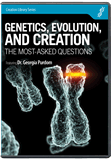
Do Genetic Differences Disprove that Neandertals and Modern Humans Interbred?
New research results comparing the mitochondrial DNA (mtDNA) have shown substantial divergence between Neandertals and modern humans, including the Cro-Magnons of ice age Europe.1,2,3 (Mitochondrial DNA, which is not the same as that carried on the chromosomes (nuclear DNA), is generally inherited unchanged from the mother. Evolutionists believe that the more differences between the mtDNA of two organisms, the longer ago their ancestors branched off from a common ancestor.) The large differences have been taken as evidence that Neandertals were a different ‘species’ from humans.
However, even some evolutionary scientists are more cautious in their conclusions of the new mtDNA genetic results. Mark Stoneking, a supporter of the mitochondrial Eve hypothesis (which actually favours the idea of Neandertal non-humanity4), is a bit nervous about the possible DNA contamination that can occur easily.5 Furthermore, the sample size of Neandertals and Cro-Magnons was quite small, and certain modern people groups are over-represented. Therefore, the results may not apply to larger populations.
Alan Cooper, an evolutionary molecular biologist at Oxford University, believes there is a slim possibility that Neandertals are ancestors of modern humans and may have contributed mtDNA to modern human populations which was lost during human population bottlenecks at the end of the ice age.6
This is quite possible according to creationist biologist, David DeWitt, who has discovered that many of the mitochondrial DNA differences are at mutational ‘hotspots,’ unlike the differences between modern humans and chimps.7,8These are sectors where substantial mutational change can occur in short periods of time. Last year, Gutierrez et al. showed that the ‘Neanderthal–Human and Human–Human pairwise distance distributions overlap more than previous studies suggest.’9 They also say, ‘The separate phylogenetic position of Neanderthals is not supported when these (other) factors are considered [i.e. the high substitution rate variation at these hot spots].’ This is similar to recently discovered rapid mtDNA changes in mice from the Chicago area.10,11 Thus, these mtDNA findings are not inconsistent with the conclusion from the evidence of fossil hybrids12 and artifacts that Neandertals were fully human.
Footnotes
- Klein, R.G., Whither the Neanderthals?, Science 299:1525–1527, 2003.
- Caramelli, D. et al., Evidence for a genetic discontinuity between Neandertals and 24,000-year-old anatomically modern Europeans, Proceedings of the National Academy of Science 100(11):6593–6597, 2003.
- Bower, B., Stone age genetics: ancient DNA enters humanity’s heritage, Science News 163(20):307, 2003.
- Wieland, C., No bones about Eve, Creation 13(4):20–23, 1991.
- Bower, B., Stone age genetics: ancient DNA enters humanity’s heritage, Science News 163(20):307, 2003.
- Cooper, A., cited in: Viegas, J., Study: human DNA Neanderthal-free, Discovery News, ‹http://dsc.discovery.com/news/briefs/20030512/neanderthal.html›, 12 May 2003.
- Skinner, W. and DeWitt, D., The Neandertal’s place in human history, Virginia Journal of Science 51(2):83, 2000
- DeWitt, D. and Skinner, W., Rate heterogeneity and site by site analysis of mtdna suggests Neanderthals and modern humans share a recent common ancestor, Discontinuity, p. 31, 2001.
- Gutierrez et al., A reanalysis of the ancient mitochondrial DNA sequences recovered from Neandertal bones, Mol. Biol. Evol. 19:1359–1366, 2002.
- Pergams, O.R.W., Barnes, W.M., and Nyberg, D., Rapid change in mouse mitochondrial DNA, Nature 423(6938):397, 2003.
- Wieland, C., ‘Fast mouse evolution’ claims: creationists should get excited, <www.answersingenesis.org/mouse>.
- Wong, K., Who were the Neandertals, Scientific American Special Edition 13(2):28–37, 2003.
Recommended Resources

Answers in Genesis is an apologetics ministry, dedicated to helping Christians defend their faith and proclaim the good news of Jesus Christ.
- Customer Service 800.778.3390
- © 2025 Answers in Genesis



